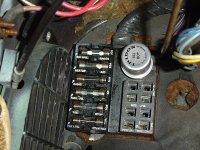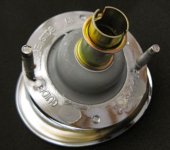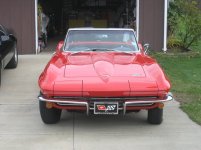Navigation
Install the app
How to install the app on iOS
Follow along with the video below to see how to install our site as a web app on your home screen.
Note: This feature may not be available in some browsers.
More options
You are using an out of date browser. It may not display this or other websites correctly.
You should upgrade or use an alternative browser.
You should upgrade or use an alternative browser.
Help! 1967 corvette fuse block
- Thread starter smitts
- Start date
- Joined
- Jan 1, 2002
- Messages
- 7,246
- Location
- Washington, Michigan
- Corvette
- '67 Marina Blue Convertible
Looking for a picture of a 1967 corvette (OEM) fuse block.
thanks,
chris........
'67 Fuse block photo below - also shown on page 55 in the '67 owner's manual.

Attachments
- Thread starter
- #3
smitts
Well-known member
Thanks so much. Just trying to see what the labeling is on the fuse block because mine is worn off in places. I am having a problem with my tail lights, brake lights. They don't work when I turn the light switch on in full mode or parking light mode, however my emergency and turn signals do work. The brake lights do not work when depressing pedal either. Fuse was checked and is OK. Any thoughts?'67 Fuse block photo below - also shown on page 55 in the '67 owner's manual.

thanks again,
chris.......
Last edited:
haganml
Well-known member
Thanks so much. Just trying to see what the labeling is on the fuse block because mine is worn off in places. I am having a problem with my tail lights, brake lights. They don't work when I turn the light switch on in full mode or parking light mode, however my emergency and turn signals do work. The brake lights do not work when depressing pedal either. Fuse was checked and is OK. Any thoughts?
thanks again,
chris.......
The fuse is in one side of your circuit. We have a fiberglass body on these cars, it will not conduct electricity, Chevrolet has added grounding to the body to allow for current flow. Rear lights are all grounded by separate straps/wires to the rest of the car.
Check for issues using a DVOM (Digital Volt Ohm Meter) set to the resistance scale. It is the Greek letter ohm (see attached photos for dial setting). One lead to the bulb socket ground (the side of the socket in the bulb holder) and one to the battery ground strap. Disconnect the battery, we don't need a shocking/sparking experience. Run a wire from the battery negative cable to where you will be testing. Do not use the positive cable, that is the fuse side of the circuit. You should not have any resistance (0.00 to 0.02). Any resistance over 0.03 indicates a poor ground. 1.0 is an open circuit.
I have attached photos of a very inexpensive DVOM ($ 9.00) which is more than adequate for checking grounds.
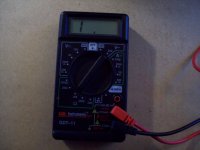
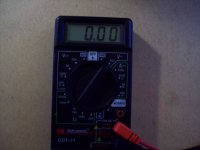 Photo 1 is a open circuit and photo 2 is a complete circuit with no resistance.
Photo 1 is a open circuit and photo 2 is a complete circuit with no resistance. I hope this will assist you in finding out your mystery problem.
vigman
Motor head!!!!
- Joined
- Feb 13, 2001
- Messages
- 3,471
- Location
- Valencia, CA,USA
- Corvette
- 88 Convert ( SOLD ) /1973 coupe 4 speed/1964 Vert!
Chris, do you have the shop manual for your car ?
So to sum it up.. the brake lights NEVER work...
Can you read a schematic? Do you have one? ( you do now )
http://65corvette.nonethewiser.net/technical/67corvette_wiring.pdf
Do you have a 12 volt test light?
1967 Corvette Dash Wire Harness Guide with Fuse Box
12.50 CHEEEEPPP
This is what the switch in the pedal assy looks like mounted....( that switch is an after market switch )
http://www.ebay.com/itm/251076480429?ssPageName=STRK:MEWAX:IT&_trksid=p3984.m1438.l2649
And the " correct " switch looks more like this:
http://www.ebay.com/itm/160904744521?ssPageName=STRK:MEWAX:IT&_trksid=p3984.m1438.l2649
Now if it was me....( assuming you have a 12 volt test light ) ...And can fit under the dash LOL
I would confirm that with the lights on that you go down to the brake switch, backprobe it.... and confirm the switch is actually working...
1 side of the switch is always hot... and the other side turns on with the pedal depressed..
If you have an after market type ( like a no so Duralast ) it won't work well....
Mike
So to sum it up.. the brake lights NEVER work...
Can you read a schematic? Do you have one? ( you do now )
http://65corvette.nonethewiser.net/technical/67corvette_wiring.pdf
Do you have a 12 volt test light?
1967 Corvette Dash Wire Harness Guide with Fuse Box
12.50 CHEEEEPPP
This is what the switch in the pedal assy looks like mounted....( that switch is an after market switch )
http://www.ebay.com/itm/251076480429?ssPageName=STRK:MEWAX:IT&_trksid=p3984.m1438.l2649
And the " correct " switch looks more like this:
http://www.ebay.com/itm/160904744521?ssPageName=STRK:MEWAX:IT&_trksid=p3984.m1438.l2649
Now if it was me....( assuming you have a 12 volt test light ) ...And can fit under the dash LOL
I would confirm that with the lights on that you go down to the brake switch, backprobe it.... and confirm the switch is actually working...
1 side of the switch is always hot... and the other side turns on with the pedal depressed..
If you have an after market type ( like a no so Duralast ) it won't work well....
Mike
Last edited:
vigman
Motor head!!!!
- Joined
- Feb 13, 2001
- Messages
- 3,471
- Location
- Valencia, CA,USA
- Corvette
- 88 Convert ( SOLD ) /1973 coupe 4 speed/1964 Vert!
Oh and.....
If the running / turn lights work... it's a good bet the ground ( for that socket ) is OK...
Mike
If the running / turn lights work... it's a good bet the ground ( for that socket ) is OK...
Mike
haganml
Well-known member
If the running / turn lights work... it's a good bet the ground ( for that socket ) is OK...
Mike
Do the running/parking lights only illuminate with the key? KOEO/KOER(KeyOnEngineOff/KeyOnEngineRunning)? I will check that schematic you so graciously supplied.
Mark.
vigman
Motor head!!!!
- Joined
- Feb 13, 2001
- Messages
- 3,471
- Location
- Valencia, CA,USA
- Corvette
- 88 Convert ( SOLD ) /1973 coupe 4 speed/1964 Vert!
Mark.....
Yes the car is fiberglass, but the frame is steel....
The ground points are from batt neg, to frame, to engine block.. and into the wiring harness ground system....
Going to the back harness there is a central tie that is a black 16 ga that ties to the rear frame ( chassis ) ..
and seperate 16 ga blacks that go to the rear lamp housings and license plate lamp, lugs go under the stud that hold the tail lamp housing to the body..
And that's not a great mechanical connection.. but it works.....
So each light of the 4 has a 16 ga ( or should ) Black on it that ties to the main wiring harness Body connector, and will tie back eventually and to chassis ( frame ) ground...
I couldn't find in the AIM a ground ( black ) to rear frame jumper... but I do have one in mine,doesn't look stock, but neither do my 6 tail lights...
Mike
Yes the car is fiberglass, but the frame is steel....
The ground points are from batt neg, to frame, to engine block.. and into the wiring harness ground system....
Going to the back harness there is a central tie that is a black 16 ga that ties to the rear frame ( chassis ) ..
and seperate 16 ga blacks that go to the rear lamp housings and license plate lamp, lugs go under the stud that hold the tail lamp housing to the body..
And that's not a great mechanical connection.. but it works.....
So each light of the 4 has a 16 ga ( or should ) Black on it that ties to the main wiring harness Body connector, and will tie back eventually and to chassis ( frame ) ground...
I couldn't find in the AIM a ground ( black ) to rear frame jumper... but I do have one in mine,doesn't look stock, but neither do my 6 tail lights...
Mike
Attachments
Last edited:
vigman
Motor head!!!!
- Joined
- Feb 13, 2001
- Messages
- 3,471
- Location
- Valencia, CA,USA
- Corvette
- 88 Convert ( SOLD ) /1973 coupe 4 speed/1964 Vert!
Other ground locations
<tbody>
</tbody>
<tbody> </tbody> |
<tbody>
</tbody>
haganml
Well-known member
My thought process was some lights did not work, some did. This could be a circuit issue. Chris had already checked the positive side of the light circuit. Checking the negative side would be a logical next step. Checking from the ground at the socket to the ground cable clamp would test the current path through any connection in the frame/body. When the test result is good, on to the next step. If results indicate a problem with that ground path, it is time for research to find what could be the issue. The actual best testing procedure of that ground circuit would be a voltage drop test. The resistance test I outlined will work and is easy to explain and understand.
2 (exhaust hanger clamp to trans cross member 1 on each clamp)
1 Frame to left side engine mount
1 Frame to body (under left rear splash shield by body mount)
1 antenea to frame (rear left fender)
1 Throttle linkage
1 Front edge of the sill ( D/S ) attaching to the #1 body mount bracket
http://www.licorvette.com/pdfcatalogfiles/catalog.pdf section 53 for PIX
<tbody>
</tbody>
<tbody>
</tbody>
The information you have supplied is excellent. Thanks Mike! The PDF catalog form supplied by Long Island Corvette is a most comprehensive resource. The wire diagrams have helped me to plot the current flow in the lights.
The orange wire from 5th fuse (# 1 being at the top of the fuse box) to the brake light switch supplies power to the brake light switch and the light switch on the dash. The white wire is a direct line from the brake light switch to the steering column turn signal switch connector. The brake light switch is a normally open switch. When the pedal is depressed it (switch closed) will supply power to the white wire. If the white wire at the brake light switch is showing battery voltage when the pedal is depressed the brake switch is good. No battery voltage on the white wire the switch is bad. No battery voltage on the orange wire means the fuse "looks" good but is open or the fuse box is bad. Check that fuse with a DVOM. You can simply replace the fuse as a test.
The brake lights use the steering column turn signal switch as part of the current path. The turn signal switch on the steering column directs power to the right side, left side or both sides. It will route the power of the side selected through the flasher relay to indicate a turn. The turn signals work, 4-way and with a side selected. The brake lights do not. These functions use the same bulb filaments. That said if the white wire at the brake switch has battery voltage it looks to me like Chris may have a steering column turn signal switch contact problem. Look for darkened connectors and burned wires in the connector to the steering column turn signal switch.
The power for the running/parking lights come directly from the dash light switch. If the fronts work and the rear do not Chris may have an issue with the body connector. If both the front and rear do not work in ether switch position it would be a problem with the light switch itself.
Remember that #5 fuse also supplies the light switch with battery power. First thing test the fuses. Some times a fuse can "look" fine visually and still be open.
Mark.
Last edited:
vigman
Motor head!!!!
- Joined
- Feb 13, 2001
- Messages
- 3,471
- Location
- Valencia, CA,USA
- Corvette
- 88 Convert ( SOLD ) /1973 coupe 4 speed/1964 Vert!
Exactly....
So it seems more DETAILED info from the OP is needed.. eh what Holmes?
It's a NYC car, read corrosion could be a big factor here.. What's it's history?.. Always garaged?... Bringing it back after X years slumber or recent purchase?
I love a good electrical puzzle....
And it starts here...
I am having a problem with my tail lights, brake lights ( Imply's rear only )
They don't work when I turn the light switch on in full mode or parking light mode, ( this needs more detail,what I get is the rear running lights do not work )
However my emergency and turn signals do work.( this imply's both sides front & rear )
The brake lights do not work when depressing pedal either. ( I assume in any mode they do not work.. ergo power to switch and switched output would be a help here as a data point )
Fuse was checked and is OK. ( how were the fuses checked?? )
So it seems more DETAILED info from the OP is needed.. eh what Holmes?
It's a NYC car, read corrosion could be a big factor here.. What's it's history?.. Always garaged?... Bringing it back after X years slumber or recent purchase?
I love a good electrical puzzle....
And it starts here...
I am having a problem with my tail lights, brake lights ( Imply's rear only )
They don't work when I turn the light switch on in full mode or parking light mode, ( this needs more detail,what I get is the rear running lights do not work )
However my emergency and turn signals do work.( this imply's both sides front & rear )
The brake lights do not work when depressing pedal either. ( I assume in any mode they do not work.. ergo power to switch and switched output would be a help here as a data point )
Fuse was checked and is OK. ( how were the fuses checked?? )
Last edited:
- Thread starter
- #12
smitts
Well-known member
So it seems more DETAILED info from the OP is needed.. eh what Holmes?
It's a NYC car, read corrosion could be a big factor here.. What's it's history?.. Always garaged?... Bringing it back after X years slumber or recent purchase?
I love a good electrical puzzle....
And it starts here...
I am having a problem with my tail lights, brake lights ( Imply's rear only )
They don't work when I turn the light switch on in full mode or parking light mode, ( this needs more detail,what I get is the rear running lights do not work )
However my emergency and turn signals do work.( this imply's both sides front & rear )
The brake lights do not work when depressing pedal either. ( I assume in any mode they do not work.. ergo power to switch and switched output would be a help here as a data point )
Fuse was checked and is OK. ( how were the fuses checked?? )
Just to clarify I meant both front & back lights & brake lights. The rear & front lights do not work in either the half switch or full headlight mode. In addition the brake lights do not work when depressing the brake pedal. Turn signals and emergency lights work both front and back. Headlights do work as well.
vigman
Motor head!!!!
- Joined
- Feb 13, 2001
- Messages
- 3,471
- Location
- Valencia, CA,USA
- Corvette
- 88 Convert ( SOLD ) /1973 coupe 4 speed/1964 Vert!
Clarity
So none of the running lights work in " normal" mode... aka the emergency flasher is off... seems to me the power feed for that circuit needs a look see..
Has the headlight switch been changed?
Do you have any history on the car?
Will you be doing the testing / work?
Mike
So none of the running lights work in " normal" mode... aka the emergency flasher is off... seems to me the power feed for that circuit needs a look see..
Has the headlight switch been changed?
Do you have any history on the car?
Will you be doing the testing / work?
Mike
- Thread starter
- #14
smitts
Well-known member
So none of the running lights work in " normal" mode... aka the emergency flasher is off... seems to me the power feed for that circuit needs a look see..
Has the headlight switch been changed?
Do you have any history on the car?
Will you be doing the testing / work?
Mike
With the emergency flashers off, and light switch on first click or full on the running lights both front & back don't come on. Headlights do work. Also brake lights do not work when depressing pedal.
No I don't have much history on car and yes I'll be doing own work. I can't tell if switch has been changed, but it doesn't look like it has. I did purchase a new OEM delco switch and will be trying that out. What puzzles me if it were a bad ground it doesn't make sense that the turn signals and emergency flashers would work. That tells me the ground is good. I'll also be checking the fuse block for power to the light switch. The fuse is OK after pulling it out and ohming it out.
vigman
Motor head!!!!
- Joined
- Feb 13, 2001
- Messages
- 3,471
- Location
- Valencia, CA,USA
- Corvette
- 88 Convert ( SOLD ) /1973 coupe 4 speed/1964 Vert!
I agree with the ground being ok for now
Chris,
12 volt test light will be your friend at this point...
I assume you just aquired the car and it's your first C2?
Mike
Chris,
12 volt test light will be your friend at this point...
I assume you just aquired the car and it's your first C2?
Mike
- Thread starter
- #16
smitts
Well-known member
Chris,
12 volt test light will be your friend at this point...
I assume you just aquired the car and it's your first C2?
Mike
I did just purchase it, however it is not my first one. I had one years ago when I was younger, so it's been awhile. Thanks for your help on this. I think I'll be finding problem soon. It is a nice running & looking car overall. I just retired awhile ago and will be enjoying a few cruises in the spring.
Attachments
vigman
Motor head!!!!
- Joined
- Feb 13, 2001
- Messages
- 3,471
- Location
- Valencia, CA,USA
- Corvette
- 88 Convert ( SOLD ) /1973 coupe 4 speed/1964 Vert!
OK well welcome to the Club.....
The other poster "Mark" is retired too and is building a 65...
I'm about a year out from retirement bringing back a 64..
So your in good company, and all here to help...
Sweet RIDE.. I spy another black one to the left.. and MORE pix please!!
Mike
The other poster "Mark" is retired too and is building a 65...
I'm about a year out from retirement bringing back a 64..
So your in good company, and all here to help...
Sweet RIDE.. I spy another black one to the left.. and MORE pix please!!
Mike
Last edited:
haganml
Well-known member
With the emergency flashers off, and light switch on first click or full on the running lights both front & back don't come on. Headlights do work. Also brake lights do not work when depressing pedal.
No I don't have much history on car and yes I'll be doing own work. I can't tell if switch has been changed, but it doesn't look like it has. I did purchase a new OEM delco switch and will be trying that out. What puzzles me if it were a bad ground it doesn't make sense that the turn signals and emergency flashers would work. That tells me the ground is good. I'll also be checking the fuse block for power to the light switch. The fuse is OK after pulling it out and ohming it out.
If I have the situation correctly in my mind here are some suggestions to help you with this task.
The running /marker lights do not ever work regardless of the ignition switch or the headlight switch position. The brake lights do not ever work. The dash lights work. The head lights work in High and Low beam. Head light doors open/close. The 4-way flasher and turn signals work.
1st problem. The front running/marker lights have a stand alone circuit from the head light switch (PPL). The rear running/marker lights are a stand alone circuit (BRN) from the headlight switch. Both do not work. Possible cause is corrosion in the light switch. Try operating the switch out then in repeatedly (10 to 15 times) very rapidly. This may knock some of the corrosion off due to friction. If that fails you will need to try another switch.
The Dash lights (DG to fuse 4, GY after fuse) are in a stand alone circuit using a dimmer rheostat and fuse 4 in the fuse box. They work. No problem.
2nd problem. The brake lights do not use the light switch in that circuit. The 4-way flasher and turn signals work. The 4-way and signals do not use the brake light switch but do use the steering column turn signal/4-way switch. Check (with the key on and with the key off) for battery voltage at the orange wire of the brake light switch. If you have battery voltage on that orange wire, depress the brake pedal. While the brake pedal is depressed check for battery voltage on the white wire of the brake light switch. If you do not have battery voltage on the white wire the problem is the brake light switch. If you do have battery voltage on the white wire the problem may be in the steering column turn signal/4-way switch. Look for overheating/corrosion in the steering column turn signal/4-way switch connector.
I do hope that this will help you find your electrical gremlins.
You can check for battery voltage using a 12 volt test light, this car does not have any sensitive/fragile electronics that can be damaged using this equipment. I use a device called a Power Probe II. It uses colored LEDs to indicate whether you have battery positive (red) or ground (green). On the handle is a toggle switch that can supply B(+) or B(-) to test the circuit. A in-line 10 amp circuit breaker is incorporated to protect the tool from a direct short to ground. There is a 20 foot cord that connects to the vehicle battery for testing anywhere on the car. Very handy tool for troubleshooting electrical issues. BUT it costs a great deal more than a simple 12 volt test light.
Good luck Chris.
Mark.
P.S. Nice Roadster!
Last edited:
- Thread starter
- #19
smitts
Well-known member
Thanks for all your help it is indeed welcome. I'll do some testing and hope to find my problem. I've got both test light & digital volt/ohm meter to do tests. Well better get testing TTYL.If I have the situation correctly in my mind here are some suggestions to help you with this task.
The running /marker lights do not ever work regardless of the ignition switch or the headlight switch position. The brake lights do not ever work. The dash lights work. The head lights work in High and Low beam. Head light doors open/close. The 4-way flasher and turn signals work.
1st problem. The front running/marker lights have a stand alone circuit from the head light switch (PPL). The rear running/marker lights are a stand alone circuit (BRN) from the headlight switch. Both do not work. Possible cause is corrosion in the light switch. Try operating the switch out then in repeatedly (10 to 15 times) very rapidly. This may knock some of the corrosion off due to friction. If that fails you will need to try another switch.
The Dash lights (DG to fuse 4, GY after fuse) are in a stand alone circuit using a dimmer rheostat and fuse 4 in the fuse box. They work. No problem.
2nd problem. The brake lights do not use the light switch in that circuit. The 4-way flasher and turn signals work. The 4-way and signals do not use the brake light switch but do use the steering column turn signal/4-way switch. Check (with the key on and with the key off) for battery voltage at the orange wire of the brake light switch. If you have battery voltage on that orange wire, depress the brake pedal. While the brake pedal is depressed check for battery voltage on the white wire of the brake light switch. If you do not have battery voltage on the white wire the problem is the brake light switch. If you do have battery voltage on the white wire the problem may be in the steering column turn signal/4-way switch. Look for overheating/corrosion in the steering column turn signal/4-way switch connector.
I do hope that this will help you find your electrical gremlins.
You can check for battery voltage using a 12 volt test light, this car does not have any sensitive/fragile electronics that can be damaged using this equipment. I use a device called a Power Probe II. It uses colored LEDs to indicate whether you have battery positive (red) or ground (green). On the handle is a toggle switch that can supply B(+) or B(-) to test the circuit. A in-line 10 amp circuit breaker is incorporated to protect the tool from a direct short to ground. There is a 20 foot cord that connects to the vehicle battery for testing anywhere on the car. Very handy tool for troubleshooting electrical issues. BUT it costs a great deal more than a simple 12 volt test light.
Good luck Chris.
Mark.
P.S. Nice Roadster!
chris........
haganml
Well-known member
Thanks for all your help it is indeed welcome. I'll do some testing and hope to find my problem. I've got both test light & digital volt/ohm meter to do tests. Well better get testing TTYL.
chris........
Testing... I am fortunate that my car is a California car, very little corrosion. I have no idea what will happen with my electrics when I put in a battery and start testing. Right now working on discovery (my Coupe is new to me also) and getting the scratch for a motor.
Mark.
Similar threads
- Replies
- 1
- Views
- 300
- Replies
- 0
- Views
- 186
- Replies
- 0
- Views
- 142


